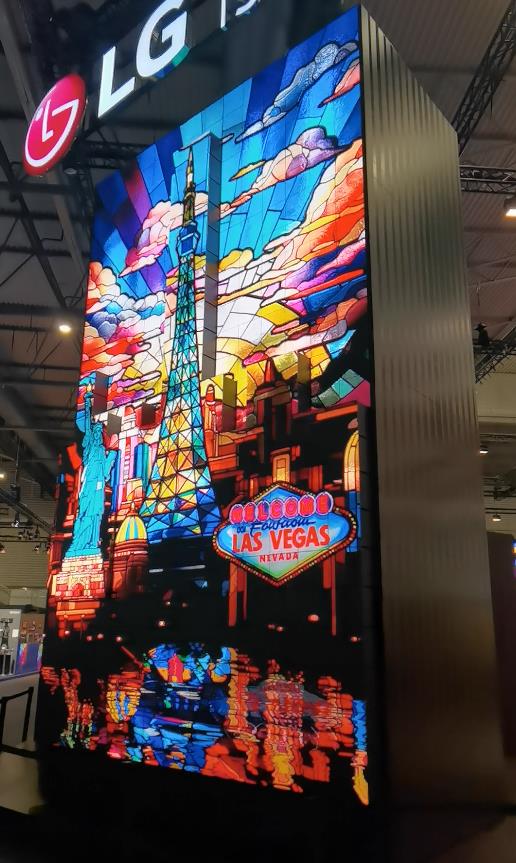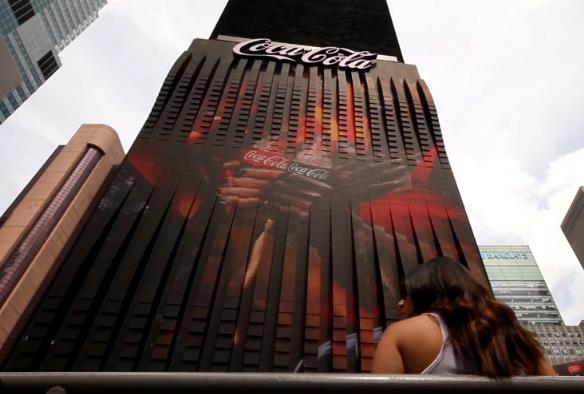Features of kinetic LED display
Advantages of kinetic LED display
The world first kinetic LED display – robotic LED for Coca Cola
Kinglight LED – your ideal choice for manufacturing high quality kinetic LED displays
At ISE 2024, the kinetic LED display from LG attracted great attention among the visitors. If you had been there, surely you wouldn’t want to miss it and would have taken a video or photos for the screen. The screen presented astonishingly impressive visuals with wave like motions of the the square LED modules driven by its robotic mechanism. And in fact, this innovative application of LEDs appeared much earlier and can be traced back in 2017. That is the famous robotic LED for Coca Cola at the Times Square, which also grabbed eyes around the world at that time. So what is the charm of a kinetic LED display? Why there are so many LED display brands developing it? Here in this article, we’ll explore more about kinetic LED displays.

LG’s kinetic LED display at ISE 2024 attracted great attention.
A kinetic LED display is an innovative application of LEDs with mechanical guide rails. Unlike traditional LED screen, a kinetic LED display includes independently moving LED modules to produce 3D dynamic effects by the screen itself, rather than using 3D visual contents.
So what features does a kinetic LED display? Here is a list that helps understand it better.
First, a kinetic LED display must adopt a modular design to achieve a 3D dynamic movement on the screen. That is, a kinetic LED display usually includes several independently movable LED modules, either rectangular or irregular shapes ones.
Second, a kinetic LED display ought to have precision guide rails (usually industrial grade linear rails) to ensure accurate and smooth movements of every independent LED modules. And meanwhile, keep a very tight gaps between adjacent LED modules. This helps the coherence of the visuals.
Third, a movement control system is integrated into the design of a kinetic LED display. This system gives accurate command for the movements of every independent LED module.
A kinetic LED display usually adopts a closed-loop stepping drive system, effectively reduce most noise produced by the movements of the LED modules.
Meanwhile, to further increase the dynamic effects, a kinetic LED display usually utilizes custom designed visual contents with 3D dynamic features to match with the movements of the LED modules.
A kinetic LED display offers various impeccable advantages when compared with traditional LED screens.
Unlike a traditional 3D LED screens, a kinetic LED display produces unique moving 3D visuals, such as a wave like style visuals created by different depths of the LED modules on the screen.
A kinetic LED display easily stands out in the crowd. If you put it up at a populated place, no doubt it will be the number on, just as the robotic LED for Coca Cola at Times Square, and LG’s kinetic LED at ISE 2024.
Utilizing a kinetic LED display for advertising can differentiate your brand or business from others, and get them well broadcast among your possible clients.
A kinetic LED display is usually highly customized according to the specific requirement of its end users. So it perfectly complies with the elements of their business, brands, or products. This makes the visual contents being displayed highly recognizable, and impress the audiences deeply.
There are various types of kinetic LED displays.
Kinetic LED display in rectangular shape is the most commonly seen type, such as the above mentioned LG’s kinetic LED at ISE 2024, and the robotic LED for Coca Cola at the Times Square.
This type of kinetic LED display has very regular shaped LED modules, the rectangular ones. These LED modules usually protrude outward to varying degrees to create a convex and concave image, thereby enhancing the layering of visual content.
And meanwhile, it avoids the relatively dull visual presentation method like traditional LED screens, and appears more flexible and active.
Kinetic designs are also applied onto spherical LED displays. The biggest differences from rectangular ones are their trapezoidal and arch shaped LED modules for creating a sphere.
We can also see oval shaped kinetic LED display on the market. This type of LED screen is in fact a pile up of several oval shaped LED displays, and each of them can be independently rotate, either in different direction or speed. This feature makes them more like oval LED strips circling around a pole.
And of course, their mechanism is much simple than the previous mentioned two.
The famous Coca Cola’s robotic LED at the Times Square is a kinetic LED display.

Robotic LED for Coca Cola at Times Square
It was put up on August 8th, 2017, on the wall surface of a six storey building. And according to report, the screen is composed by 1760 moving LED cubes, and measures 68 feet in height and 42 feet in width.
Some reports also say the screen is composed by 35 pieces in horizontal and 56 pieces LED cubes in vertical, with each LED cube measures 1.2*1.2 feet. That makes the total screen have 1960 pieces LED cubes.
But according to another report, the robotic LED for Coca Cola is in fact composed by 1715 moving LED cubes and 245 static ones. That makes the total number of LED cubes to 1960 pieces.
It seems that 1960 pieces of LED cubes are more reliable.
But no matter how many LED cubes it have, the Coca Cola’s robotic LED is certainly the world’s first and the largest kinetic LED display at that time.
Simply to put, this installation of kinetic LED display started a new form of digital advertising.
As a leading enterprise in LED package, Kinglight provides various high quality LEDs for screen manufacturing. If you’re making kinetic LED displays or any other types of LED screens, feel free to write to sales@kinglight.com.